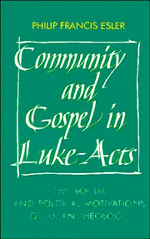Book contents
- Frontmatter
- Contents
- Acknowledgements
- List of abbreviations
- 1 The socio-redaction criticism of Luke–Acts
- 2 The community
- 3 Sectarian strategies
- 4 Table-fellowship
- 5 The law
- 6 The Temple
- 7 The poor and the rich
- 8 Rome and the ancestral theme
- Epilogue: community and Gospel
- Notes
- Index of biblical references
- Index of secondary authors
1 - The socio-redaction criticism of Luke–Acts
Published online by Cambridge University Press: 10 January 2011
- Frontmatter
- Contents
- Acknowledgements
- List of abbreviations
- 1 The socio-redaction criticism of Luke–Acts
- 2 The community
- 3 Sectarian strategies
- 4 Table-fellowship
- 5 The law
- 6 The Temple
- 7 The poor and the rich
- 8 Rome and the ancestral theme
- Epilogue: community and Gospel
- Notes
- Index of biblical references
- Index of secondary authors
Summary
Social and political influences on Lucan theology
At one point in The Theology of St Luke, during a discussion of the relationship between the church and the world, Hans Conzelmann asserts that Luke ‘lays as the foundation of his defence of the Church a comprehensive consideration of its general position in the world; he fixes its position in respect of redemptive history and deduces from this the rules for its attitude to the world’. To hold this opinion Conzelmann must assume both that Luke's theological position (his attitude to redemptive history) and his views on how the church must adapt to its social and political context are quite distinct and that the first has generated the second. Upon just a little reflection, both of these assumptions begin to appear highly arbitrary and unlikely. Consider what model they imply for the manner of Luke's composition of his Gospel and Acts. Is it not that of a glorified armchair theorist, who ponders over purely religious questions before issuing forth from his scriptorium to enlighten his fellow-Christians as to the correct attitude which they and their community should adopt to their social and political environment? Not that Conzelmann is alone in subscribing to this model of theological activity. It has an ancestry at least as old as the pre-exilic traditions of Moses' Torah-laden descent from Mount Sinai, and flourishes still in much European theology, as Latin American theologians tirelessly observe.
- Type
- Chapter
- Information
- Community and Gospel in Luke-ActsThe Social and Political Motivations of Lucan Theology, pp. 1 - 23Publisher: Cambridge University PressPrint publication year: 1987



